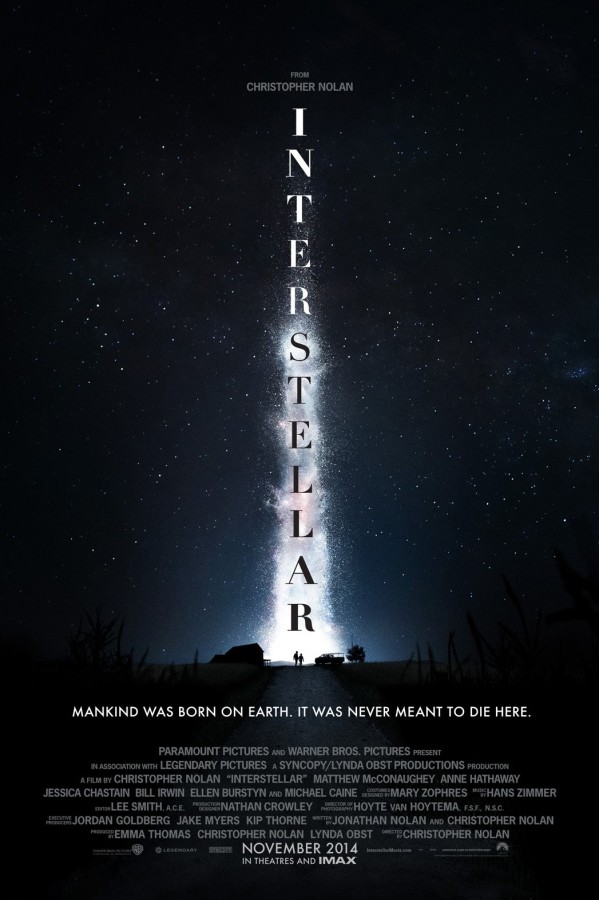Interstellar
Christopher Nolan’s own 21st century version of 2001: A Space Odyssey, Interstellar is a loud, elaborate, and large-scale motion picture that, despite its initially sluggish pace, managed to capture my imagination and took me on a science joy-ride highlighted by a stellar performance from lead Matthew McConaughey. With a star studded cast also featuring stars Anne Hathaway, Michael Caine, and Matt Damon, Interstellar has lived up to its lofty expectations and trumps the likes of other recent science fiction movies like Ridley Scott’s Prometheus.
Set in the near future, Interstellar finds a former NASA pilot Cooper (Matthew McConaughey) managing a farm as the entire human population turns to agriculture to combat recent crop blights. When he and his daughter, Murph (Jessica Chastain), discover a “ghost” leaving behind mysterious messages in the dust within their house, Cooper interprets these as binary coordinates, which leads him to an undisclosed NASA institution led by Professor John Brand (Michael Caine). As strange as this idea sounds, McConaughey’s adept acting made this binary code discovery seem plausible.
At the station, Brand reveals to Cooper plans to set out into a nearby wormhole, presumably placed there by artificial intelligence, and asks him to come back to NASA to pilot the spacecraft. Cooper consents and, along with biologist Amelia Brand (Anne Hathaway and yes, the daughter of the Professor), travels into the wormhole with scientists Romilly (David Gyasi) and Doyle (Wes Bentley). Their mission: to uncover possible habitable planets, with the fate of mankind hanging on their expedition. While it may seem a little cheesey … this is where the acting really starts to shine.
All four actors and actresses depict their characters extremely well, with McConaughey’s portrayal of Cooper’s longing for home being the most captivating. The film reaches emotional heights when, after spending just mere hours on a possibly habitable planet, the crew finds out that 23 years have passed on Earth. This idea of time dilation was particularly interesting to me, how two places, due to their differences in gravity, will pass time at different rates.
Of course, evil lurks, and who would have thought it would be Matt Damon’s character, Dr. Mann? Dr. Mann had been a scientist who embarked on the same journey years prior, and was presumed alive due to the transmissions still being sent from his base on the planet he was stationed on. After a tense debate, the crew, with enough fuel to make only one, final trip, decide to check out Mann’s planet. To their dismay, the crew found Mann’s planet to be completely uninhabitable, and discover that Mann had left Earth with the intention of leaving it to die, instead of saving it. Mann’s quick transformation was unexpected, and gave the film a much needed plot twist.
In one of the more shocking moments in the film, Cooper sacrifices himself along with a portion of the ship to give it enough momentum to escape the planet’s gravitational field. After drifting in space for a bit, Cooper lands within a “tesseract,” where he finds himself able to communicate with his daughter back on Earth. Now this is where the time relativity gets weird, but Cooper discovers that the “ghost” sending binary code messages in the past was actually him in his future self in this tesseract! Ultimately, through this tesseract, Cooper and Murphy help to save the human race (if you believe in miracles…)!
Overall, Nolan’s film gave me what I had come to expect from his films: intense realism and spot-on individual performances. Though some may complain of Interstellar’s convoluted plot and reliance on theory for most of its science, it still provides enough emotion and a solid climax that ultimately provided me with an enthralling movie experience.



